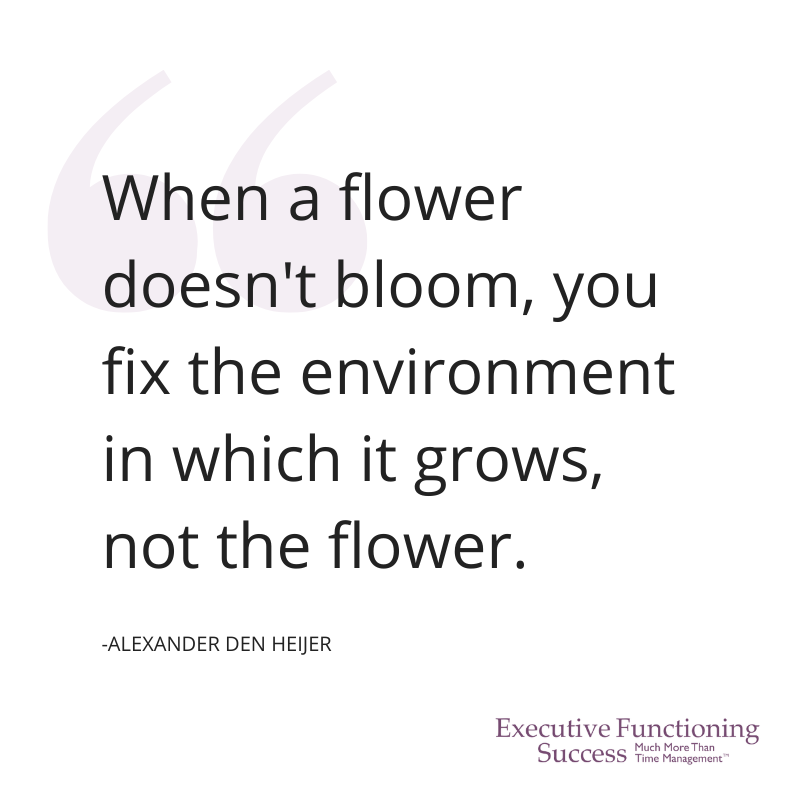When I started my business back in around 2010, it amazed me that there were no singular and agreed-upon definitions for the individual executive functions of the brain.
While research and understanding of executive functions have vastly expanded since those days, in some ways this remains true today. The framework for thinking about executive function skills often depends upon which authority you reference.
In our Seeing My Time® curriculum, I chose to follow the model put forward by psychologists Peg Dawson and Richard Guare, which shows the complexity of the skills without being overwhelming. I feel they did a very good job in both naming executive function skills and giving examples of how the skills are used in daily life.
It recently came to my attention that Dawson & Gurare have added a NEW executive functioning skill – one that was not included in the earlier editions of their work. The skill of Stress Tolerance. Here’s the definition from their website:
Stress Tolerance is the ability to thrive in stressful situations and to cope with uncertainty, change, and performance demands. We generally reserve our discussion of this skill to adults, since it seems more relevant with this population. We find it helps people understand the kind of work environment they do best in.
Since reading that definition, Stress Tolerance has been bouncing around in my brain. I have been thinking back on past and present clients, imagining how I might incorporate this new executive function skill into my work. Here are my thoughts so far.
Spoiler alert: I am still working it out!
Stress Tolerance and Anxiety
I have worked with clients who struggle with stress tolerance more than most. However, I wonder how much of that intolerance to stress is situational versus being foundationally hard-wired in the brain.
In my mind, the answer to this question is blurred by our emotional brain’s automatic anxiety response to situations of uncertainty. Is Stress Tolerance the term one can use to discuss anxiety and the sympathetic nervous system’s impact on executive functioning? I am going to start testing this, in part because the phrase is less charged than using the word “anxiety”.
I am curious to see if using Stress Tolerance as an executive function skill for self-evaluation (versus a focus on the emotion of anxiety), will make a positive difference in clients’ self-awareness.
Additionally, I find myself wondering why Dawson & Guare say that this executive function skill best applies to adults (typically in a work setting) and not to students. School is the work environment for students. School is FULL of uncertainty, change and performance demands!

In the Seeing My Time® curriculum, we address this issue in part when we ask the question: “What shaped head do you have?”
The goal here is to help neurodivergent minds become aware that the expectations of typical schools might not be a fit for them. Rather than feeling like a failure in school, one should look for a learning environment that is a better match or fit for your kind of brain.
Or at the very least, become aware that it is not their fault. As I always say, “blame the brain, not the person.”
Blooming in a New Environment
 As I write this, I am reminded of a mother I met last winter, who had been living in New York City prior to COVID. Her young son had significant challenges in his school setting and the conflicts spilled over into their home life.
As I write this, I am reminded of a mother I met last winter, who had been living in New York City prior to COVID. Her young son had significant challenges in his school setting and the conflicts spilled over into their home life.
When COVID hit, they left the city to spend time at a second family home in a small town in Vermont. Their son was now in a much more laid-back school with a smaller class size and a lot of time and activities outdoors.
The new school created a huge change in her son’s behavior. It was like he became a different person. He was much easier to live with. The difference was so significant that the parents chose not to return to New York City.
They now commute there as needed for their work. In essence, the change lowered the stress for the whole family. Their son needed a school match for his kind of brain, just as one would direct an adult to consider the most appropriate job for their personal stress tolerance.
As I move forward in working with this new executive function skill, I will experiment with a number of questions. Primarily, is this a skill that one can improve over time with the use of external support? In other words, can you build up a better tolerance for stress?
Dawson and Gurare’s definition seems to imply that a choice to change environments is necessary versus using some sort of strategy or tool to compensate for limited stress tolerance.
Our understanding of the brain is an ever-evolving process that must include the world around us as it changes. I will let you know what I discover!
Always learning…


